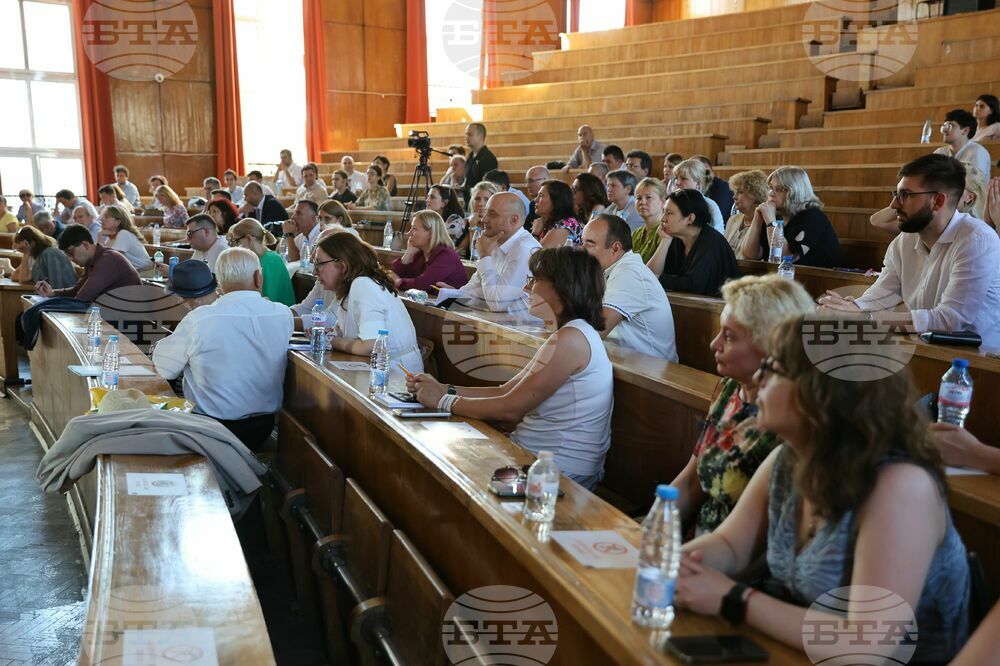site.btaJudicial Reform and Rule of Law in Bulgaria Debated at Sofia University


Representatives of the judiciary and legal experts discussed the rule of law in the European Union and the state of Bulgaria’s judicial system at a public debate held at Sofia University St Kliment Ohridski on Wednesday.
The event was organized by the Department of International Law and International Relations at the university’s Faculty of Law and the Bulgarian Institute for Legal Initiatives.
The composition of the Inspectorate and the Supreme Judicial Council must be changed first, and only then the Judicial System Act, National Assembly Chair Nataliya Kiselova said. She added that altering the election procedure itself would delay the vote by at least six months, so changing it would not be necessary.
Bilyana Gyaurova-Wegertseder, Director of the Bulgarian Institute for Legal Initiatives, noted that the judicial system operates in a fragmented manner and lacks clear policies. She observed that political influence is prevalent in the judiciary, but there are no substantive policies guiding the system. A key issue for the judiciary is funding—specifically, how resources are allocated and whether they are adequate.
Gyaurova-Wegertseder observes that double standards are apparent in the work of the Supreme Judicial Council, particularly in its core functions of personnel management and the professional development of magistrates.
She also questioned whether the Constitution would be amended, particularly following the changes made in December 2023.
Hristo Hristov from the Department of International Law and International Relations at Sofia University St. Kliment Ohridski noted that some bodies are operating with expired mandates. He indicated that the optimal solution is for the legislature to meet its constitutional duty by appointing a new composition of the Supreme Judicial Council.
Hristov suggested that it might be time for carefully considered amendments to the Constitution and the Judicial System Act.
Judge Atanas Atanasov noted that the Union of Judges consistently advocates for reforming the initial appointment and selection process. He pointed out the importance of assessing not just professional knowledge, but also candidates’ personal qualities, integrity, and psychological suitability for judicial work, as this role demands attributes not possessed by every law school graduate.
A new approach is required for the organization and management of competitions. In recent years, the postponement, cancellation, and annulment of competitions have caused significant challenges in some courts. Regarding secondments, Atanasov noted that general criteria and selection procedures should be included in the Judicial System Act.
Judicial independence is not an abstract concept; it has specific constitutional and legal features, said Ivan Bregov, head of the Legal Programme at the Institute for Market Economics. According to him, the most crucial aspect is that courts must decide based on their own conviction. Ensuring judicial independence involves the legal status conferred on judges, prosecutors, and investigating magistrates by the Constitution, which defines the conditions for their appointment and removal.
Article 117, paragraph 2 of the Constitution provides that the judiciary has an independent budget, which is one aspect of judicial independence, Bregov observed. This brief provision has led to 16 Constitutional Court decisions—nine finding unconstitutionality and five providing interpretations. According to him, this suggests that financial autonomy is a key factor in ensuring judicial independence.
Atanaska Disheva of the Supreme Judicial Council noted the risk that amending the Constitution could lead to changes in areas unrelated to the judiciary.
Timely announcement, organization, and completion of judicial competitions must be ensured through legislative amendments. Disheva also noted a significant lack of transparency in the competition process.
She noted the necessity of establishing an effective mechanism to investigate cases involving influence networks within the judiciary.
Atanas Slavov, a member of the National Assembly from Continue the Change–Democratic Bulgaria (CC-DB), said it is important to make clear that last year’s Constitutional Court decision on certain constitutional amendments “was conceptually flawed.” He acknowledged that some arguments may be valid, but believes the court’s judicial activism was influenced by political factors.
“Judicial reform will continue for another 35 years because it is not truly about legal justice, but about a struggle for power,” said Radomir Cholakov, Deputy Chair of the Commission on Protection of Competition. “This is an effort to transfer authorities that constitutionally belong to Parliament to the so-called independent judiciary. Over the past 15–20 years, much of the debate has focused on undermining Parliament, portraying MPs as corrupt and incompetent, and advocating for external bodies to oversee the judicial system instead,” Cholakov added.
State of Justice Systems in the EU
The European Commission released data on the state of judicial systems in EU member states on Tuesday. In most countries, citizens report that judicial independence has either improved or stayed the same compared to the previous year.
Among Bulgarian citizens, 63% (compared to 57% in the EU) question the independence of the judiciary. In Bulgaria, 93% and in the EU, 92% report no involvement in legal disputes over the past two years.
In Bulgaria, 3% of respondents consider judicial independence to be very good (compared to 13% in the EU), 24% rate it as good (41% in the EU), 33% as bad (23% in the EU), and 30% as very bad (13% in other EU countries).
/NZ/
Additional
news.modal.image.header
news.modal.image.text
news.modal.download.header
news.modal.download.text
news.modal.header
news.modal.text
















